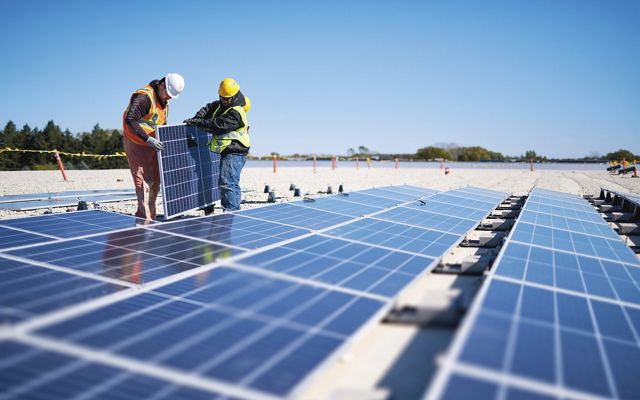Our Climate Emergency Requires an Immediate, Complete, and Decisive Response
By Leonardo Lacerda, Former Global Managing Director, Climate
There is an undeniable connection between human health and the health of the planet. At its origin, the word “crisis” in Greek meant a “turning point in a disease” in which the patient either heals or perishes.
Today, we are facing a climate and biodiversity crisis that demands an emergency response.
If there’s anything the last two-plus years dealing with a global pandemic have taught us, it is that incremental measures and partial actions are wholly insufficient to deal with the scale of the challenge that the world faces.
Be it COVID-19 or climate change, the need for behavior transformation is only matched by the need for an immediate and economy-wide movement to dramatically reduce greenhouse gas emissions and protect the most vulnerable communities and ecosystems across the world.
It should be obvious to state, but climate change is a fact of our everyday life, already affecting humans in some stunning and undeniable ways: flooding, forest fires, drought, famine, heatwaves, and more intense and longer storm seasons, just to name a few—but the fight is not lost. While this is intimidating and the challenges we must overcome are numerous, the opportunities for us to overcome them are still within reach.
The most recent Intergovernmental Panel on Climate Change (IPCC) reports affirm that we still can keep the world below the most critical target of 1.5 degrees Celsius if decisive actions are taken. While keeping warming below 1.5 degrees C is our goal, we must stress that every tenth and even hundredth of a degree makes a world of difference for what our future holds.

Those small differences, and their potential impact on life, hold great personal value to me as well. As a native Brazilian, and like so many of my compatriots, I feel deeply fortunate to have been born and shaped by the incredible nature and cultures of my country. While my career and curiosity for other cultures granted me the opportunity to call Europe home for many years, I am once again able to relish the landscapes of my childhood, albeit with exceptions.
Recently, I had the opportunity to take a flight from Brasilia to Belem. It had been over twenty years since I had last flown that route. Years prior, the flight offered a birds-eye view of pristine cerrado and then rainforest – a carpet of green cut only by the Tocantins and Amazon Rivers and their tributaries.
However, just two decades later, huge blocks of right-angled brown and pale-green agricultural and cattle ranching squares cut up the once unified green: a cubist painting of unnatural sharp-edged forms.
To say the sight was disheartening would be an understatement, I was truly overwhelmed with a sense of dread. I am proud that my country can help to feed the world, but there are certainly less destructive ways to achieve that objective.
Quote
Healing the planet isn’t a solitary mission. Everyone from concerned citizens to billionaires to government officials are rolling up their sleeves.
That trip helped me clearly appreciate the magnitude and complexity of the challenge in front of us. It also reminded me that healing the planet isn’t a solitary mission. Everyone from concerned citizens to billionaires to government officials are rolling up their sleeves.
As a leader of the environmental space, it is imperative that we create a roadmap for the implementation of climate goals, with ambitious steps along the way to deliver the kind of foundational investments and activities necessary to create scalable change. My vision to help deliver this future requires:
- Accelerating the renewable energy transition through policy, market, and regulatory solutions with a particular focus on facilitating the rapid siting of solar and wind energy in ways that benefit communities and advance conservation goals.
- Designing and implementing natural climate solutions to mitigate greenhouse gas emissions through conservation, improved management, and restoration of critical ecosystems around the globe.
- Achieving effective and just adaptation outcomes through nature-based solutions that help communities adapt to the impacts of a changing climate and build their resilience.
These strategies leverage science, policy, and finance to provide solutions that can help people and nature thrive right now.


Together, we can and will create a new future in which both nature and humanity thrive.
What does this future look like? A world where:
- Communities are powered by clean, efficient energy that provides strong job opportunities
- People who've suffered from the harmful effects of pollution are breathing clean air, drinking clean water, and living free of environmental toxins.
- Verdant forests are providing oxygen, habitat, freshwater, and wonder.
- Farmers, ranchers,and foresters are growing more food and timber in ways that make soils healthier, food more nutritious, water cleaner, and the climate more stable.
- Our shorelines, reefs, mangroves, and marshes are acting as natural breakwaters to lessen the impacts of storms.
A better world for all is before us, but it requires resolve to face the urgency; innovation, investments, and entrepreneurship to create the unfathomed; right policies and courage to let go of the past and embrace the new.
Deeds are first dreamt. Actions follow where there's will.
Our planet and our global community are facing the greatest crisis any of us will likely ever know. It is truly a terrifying moment to be alive, but it is also miraculous to be able to do so much at a time that matters so greatly in human history.
This is the call of our times. And inspired by my indefatigable 96-year-old fellow citizen, the late poet Cora Coralina: “There is more hope in my footsteps than despair on my shoulders."
Global Insights
Check out our latest thinking and real-world solutions to some of the most complex challenges facing people and the planet today.



